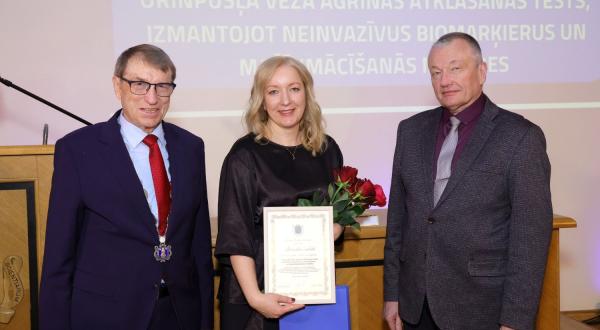The University as a Knowledge and Coordination Centre for the Digital Health Ecosystem
We live in a rapidly changing society and environment. The COVID-19 pandemic has caused large-scale changes. Regardless of what tomorrow might bring, we know what steps have to be taken to mitigate risks.
It is very important to lead a healthy lifestyle, make healthy choices and live in a healthy environment in order for people to be able to maintain, or restore their health. An improved evidence-based health policy and more effective solutions for health promotion and disease prevention are essential. Here are some examples where data plays a major role: personalised medicine, defeating COVID-19 and cervical cancer screening and prevention.
Personalised medicine
One of the latest and most effective healthcare solutions is personalised medicine, which goes hand in hand with genetics. Scientific findings show which diseases each person's unique genetic and molecular profile makes them susceptible to, as well as each person’s individual response to different medicines.
Knowing someone’s genetic profile, the associated risks and expected reactions, doctors can make better decisions and provide better and safer treatment, which results in prolonging the patient’s life.
The prerequisite for this is data – health data, medical data and research data. If the data is compatible and complementary, it can be quickly and efficiently used for our benefit. If there is no data, there might be cases when people do not receive the help they need or, even worse, the treatment they receive might not result in the expected outcome.
Defeating COVID-19
The COVID-19 pandemic shows how important it is that data on both the virus and on patients is collected regularly. Moreover, it is equally important for the data to be made available for analysis by the responsible services worldwide. Only by integrating data from around the world can scientists track the origins and spread of the virus in Latvia and, as a result, make treatment as effective as possible. In spring, we managed to stop the mutations of the virus.
Information on how the virus behaves and how long it can survive in the body, how it affects different organ systems, how quickly immunity forms and how long immunity lasts is essential. These questions can only be answered by obtaining and analysing data aggregated through extensive international studies.
Cervical cancer screening
In order to be able to completely prevent cervical cancer and prolong women's lives, it is necessary to obtain data from the cancer register, the HPV (human papillomavirus) vaccination register as well as from cancer cell and HPV screenings (for both men and women). Such registers would allow physicians to detect pathologies and HPV in time and be able to react accordingly. A lot of work has to be done to improve the quality and compatibility of the registers.
RSU as knowledge and coordination centre for the digital healthcare ecosystem
Rīga Stradiņš University (RSU) is a research and science university overseen by the Ministry of Health. The leading specialists in public health and medicine as well as data specialists and medical lawyers work at our university, and we can therefore provide expertise related to the use of data.
We have already created two open access repositories, which are connected to the European Open Science Cloud. Also, a Bioinformatics Research Unit has been established at RSU, led by Baiba Vilne. The development of the Digital and Visual Technology Centre is currently underway at the RSU Institute of Stomatology. It is a part of the consortium of the Baltic Biomaterials Centre of Excellence managed by Riga Technical University. It provides a full biomaterial development cycle from the development of materials to implementation at clinics.
Health and medical data can be distinguished from other data by the fact that the data is regarded as sensitive and belongs to the individual, and the individual themselves can decide how others handle their data. At the same time, this type of data is very important for medical education and research. Clear regulations and procedures must be introduced in order to open such data to studies and research and to integrate it with data obtained through research. Unfortunately, this has not yet been done. Therefore, we are a part of the inter-institutional working group of the Ministry of Health and we are actively working on drafting the Biobank Law. We have signed a memorandum of cooperation with the Ministry of Environmental Protection and Regional Development, and are working together with the Ministry of Economics and the Ministry of Education and Science.
For obvious reasons investments in the digitalisation of the medicine and healthcare have not been made until now. The situation is now changing as digital transformation is a priority for Latvia and the EU. We have to develop top-level digital skills, namely those related to the provision and development of healthcare services, data analysis and research. We also have to create the appropriate infrastructure.
Regarding the technical side, we have prepared a project for the development of open data infrastructure, which complements the projects of our partners – Riga Technical University, the Latvian Biomedical Research and Study Centre, the Latvian Institute of Organic Synthesis, University of Latvia and hospitals. We believe that through joint work and by applying our knowledge, we will soon reach good results. For this to happen, the data has to be integrated and the parties have to work in a coordinated manner. Taking our competence and network of specialists into consideration, as well as the fact that we are closely connected with university hospitals in Riga (Pauls Stradiņš Clinical University Hospital, Riga East Clinical University Hospital, and the Children's Clinical University Hospital) as well as regional hospitals, we see that we can be useful – we can develop regulatory frameworks and participate in the use technical data solutions and integrate such solutions with the healthcare system. We can take on the role of coordinating the ecosystem!
Source: Delfi.lv
Related news
 RSU research project on early diagnosis of bladder cancer receives recognition from the Latvian Academy of SciencesRecognition, Research, Innovation
RSU research project on early diagnosis of bladder cancer receives recognition from the Latvian Academy of SciencesRecognition, Research, Innovation



